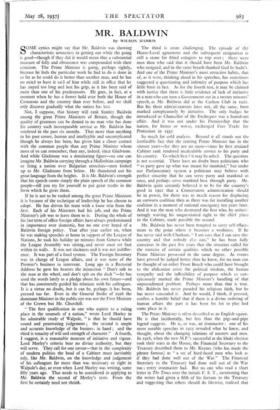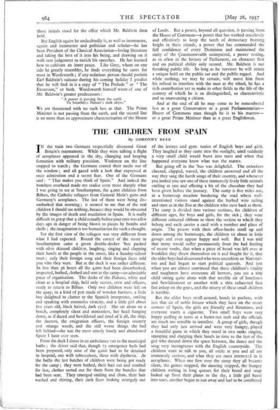MR. BALDWIN
By WILSON HARRIS
SOME cynics might say that Mr. Baldwin was showing characteristic astuteness in getting out while the going is good—though if they did it would mean that a substantial measure of folly and obtuseness was compounded with their cynicism. The Prime Minister is going, perhaps rightly, because he feels the particular work he had to do is done in so far as he could do it better than another man, and he has no mind to have it said of him while still in office that he has stayed too long and lost his grip, as it has been said of more than one of his predecessors. He goes, in fact, at a moment when he has a firmer hold over both the House of Commons and the country than ever before, and we shall only discover gradually what the nation has lost.
Not, I suppose, that history will rank Stanley Baldwin among the great Prime Ministers of Britain, though the quality of greatness can be denied to no man who has done his country such incomparable service as Mr. Baldwin has rendered in the past six months. That more than anything in his past career, human and intelligible and uncomplicated though he always has been, has given him a closer contact with the common people than any Prime Minister whom most of us can remember, than any, indeed, since Gladstone.
And while Gladstone was a dominating figure—no one can imagine Mr. Baldwin carrying through a Midlothian campaign or firing a nation over Bulgarian atrocities—men looked up to Mr. Gladstone from below. He thundered out his great language from the heights. It is Mr. Baldwin's strength that his speech seems simply the plain speech of the common people—till you try for yourself to put great truths in the form which he gives them.
If he is not to be ranked among the great Prime Ministers it is because of the technique of leadership he has chosen to adopt. He has driven his team with a loose rein from the first. Each of his Ministers had his job, and the Prime Minister's job was to leave them to it. During the whole of his last term of office foreign affairs have always predominated in importance over domestic, but no one ever heard of a Baldwin foreign policy. Year after year earlier on, when he was making speeches at home in support of the League of Nations, he took his holiday 90 minutes from Geneva while the League Assembly was sitting, and never once set foot within its Walls. It was not slackness and it was not indiffer- ence. It was part of a fixed system. The Foreign Secretary was in charge of League affairs, and it was none of the Premier's business to intervene. Long ago in a Rectorial Address he gave his hearers the injunction "Don't talk to the man at the wheel, and don't spit on the deck "—he has used the words lately as a pledge about his own future—and that has consistently guided his relations with his colleagues. It is a virtue no doubt, but it can be, perhaps it has been, pressed too far. Even in the General Strike of 1926 the dominant Minister in the 'public eye was not the First Minister of the Crown but Mr. Churchill.
"The first qualification in one who aspires to a ruling place in the counsels of a nation," wrote Lord Morley in his admirable study of Walpole, "is that he should have sound and penetrating judgement ; the second is ample and accurate knowledge of the busines; in hand ; and the third is tenacity of will and strength of character." A fourth, I suggest, is a reasonable measure of initiative and vigour. Lord Morley's criteria bear no divine authority, but they will serve. They call for one caveat—that in the complexity of modem politics the head of a Cabinet must inevitably rely, like Mr. Baldwin, on the knowledge and judgement of his colleagues far more than was necessary or right in Walpole's day, or even when Lord Morley was writing, some fifty years ago. That needs to be considered in applying to Mr. Baldwin the second of Morley's tests. From the first he certainly need not shrink. The third is more challenging. The episode of the Hoare-Laval agreement and the subsequent resignation is still a stone for blind eulogists to trip over ; there were men then who said that it should have been Mr. Baldwin who resigned, and in the same breath thanked God he hadn't. And one of the Prime Minister's most attractive habits, that of, as it were, thinking aloud in his speeches, has sometimes suggested a questioning and infirmity of purpose which has little basis in fact. As for the fourth test, it may be claimed With justice that there is little evidence of lack of initiative in a man who can turn a Government out in a twenty minutes' speech, as Mr. Baldwin did at the Carlton Club in 1922. But his three administrations have not, all the same, been marked conspicuously by initiative. The only budget he introduced as Chancellor of the Exchequer was a humdrum affair. And it was not under his Premiership that the nation, for better or worse, exchanged Free Trade for Protection in 1932.
So much for cold analysis. Beyond it all stands out the irrefutable fact that the retiring Prime Minister has in the sixteen years—for they are no more—since he first attained Cabinet rank rendered incalculable service to his party and his country. To which first ? it may be asked. The question is not essential. There have no doubt been politicians who "to party gave up what was meant for mankind," but under our Parliamentary system a politician may believe with perfect sincerity that he can serve party and mankind at once, and perhaps serve mankind best through party. Mr. Baldwin quite certainly believed it to be for the country's good in 1922 that a Conservative administration should be in power, for there was as much reason for displacing an outworn coalition then as there was for installing another coalition in a moment of national emergency ten years later. And it was the man who destroyed the first who, by unhesi- tatingly waiving his unquestioned right to the chief place in the Cabinet, made possible the second.
Mr. Baldwin has never been tempted to carry self-efface- ment to the point where it becomes a weakness. If he has never said with Chatham," I am sure that I can save this country and that nobody else can," he has been fully conscious in the past five years that the situation called for the exercise of certain qualities which no other possible Prime Minister possessed in the same degree. As events have proved he judged better than he knew, for no man can be thought of on either Front Bench who could have brought to the abdication crisis the political wisdom, the human sympathy and the inflexibility of purpose which so con- spicuously marked the Prime Minister's handling of that unprecedented problem. Perhaps more than that is true. Mr. Baldwin has never paraded his religious faith, but he has never concealed it. And he would, I think, if pressed, confess a humble belief that if there is a divine ordering of human affairs the part it has been his lot to play had some place in it.
The Prime Minister is often described as an English squire. He is that incidentally, but less than the pigs-and-pipe legend suggests. He is, or was, an ironmaster : one of his more notable speeches in 1925 revealed what he knew, and thought, about the changing relations of masters and men. In 1918, when the new M.P.'s successful at the khaki election took their seats in the House, the Financial Secretary to the Treasury described them to Mr. Keynes (who has made the phrase famous) as "a set of hard-faced men who look as if they had done well out of the War." The Financial Secretary to the Treasury had done well out of the War too ; every ironmaster had. But no one who read a short letter in The Times over the initials F. S. T., mentioning that the writer had given a fifth of his fortune to the Treasury and suggesting that others should do likewise, realised that those initials stood for the office which Mr. Baldwin then held.
But English squire he undoubtedly is, as well as ironmaster, squire and ironmaster and politician and scholar—he has been President of the Classical Association—loving literature and taking the best of it into his being, and drawing on it with rare judgement to enrich his speeches. He has learned how to cultivate an inner peace. Like Grey, whom on one side he greatly resembles, he finds everything he cares for most in Wordsworth ; if any nefarious person should purloin Earl Baldwin's suitcase during his coming holiday I predict that he will find in it a copy of "The Prelude" or "The Excursion," or both. Wordsworth himself wrote of one of Mr. Baldwin's greater predecessors :
"A power is passing from the earth To breathless Nature's dark abyss."
We are threatened with no such loss as that. The Prime Minister is not passing from the earth, and the second line is no more than an approximate characterisation of the House of Lords. But a power, beyond all question, is passing from the House of Commons—a power that has worked ceaselessly and effectively to keep the torch of democracy burning bright in these islands, a power that has commanded the full confidence of every Dominion and maintained the unity of the Commonwealth unimpaired, a power resting, as so often in the history of Parliament, on character first and on political ability only second. Mr. Baldwin is not forsaking public life. So long as he survives he will retain a unique hold on the public ear and the public regard. And while nothing, we may be certain, will move him from his refusal to interfere with the man at the wheel, he has a rich contribution yet to make in other fields to the life of the country of which he is so distinguished, so characteristic and so unassuming a citizen.
And at the end of all he may come to be remembered less as a great Conservative or a great Parliamentarian— House of Commons man though he is to his marrow— or a great Prime Minister than as a great Englishman.







































 Previous page
Previous page